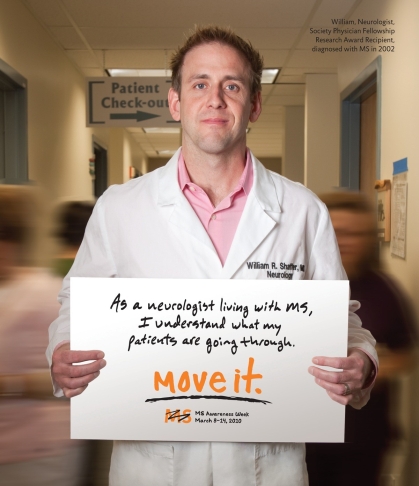
A Publication for Alumni & Friends of Rutgers Robert Wood Johnson Medical School

‘It’s Been a Wild Ride’: Serendipitous Events Guide William Shaffer, MD ’04, to a Fulfilling Career in Neurology

Long-haired drummer, multiple sclerosis patient, life-changing neurologist. These could be identifiers for three very different individuals but in this case, he is one man, William Shaffer, MD ’04.
Close to a decade prior to attending medical school, 22-year-old Bill Shaffer was a drummer for the band, The Breathers, while attending college in his home state of Illinois. In 1988, when the band’s success began to rise, he dropped out of school and moved to New Jersey to sign with Premier Talent, the same booking agency that worked with U2 and The Who.
Within one year, the band recorded their first record in Hoboken at Waterfront Studios, and soon the Breathers were opening for groups like Flock of Seagulls, Stray Cats, and the Replacements.
However, scheduling disputes with the agency, missed performances, and conflicts between band members led to the band being released from their contract in 1992.
Over the next few years, Bill recommitted to his education and enrolled at Rutgers, earning stellar grades in pursuit of his undergraduate degree. Following graduation in 2000, he drew inspiration from his girlfriend, soon to be wife, as she applied for physician assistant programs.
With the band falling apart, and not giving it much thought, he decided to apply to medical school but was wait-listed. He was notified of his acceptance just days before first-year medical students were to report on campus.
Dr. Shaffer remembers, “In those days if you were using the computer when someone called, the caller got a busy signal. On this day, I was under my desk trying to figure out why my computer wasn’t connecting when the phone rang. It was Robert Wood Johnson Medical School asking me if I wanted the spot that just opened up. If I was on the computer as I intended, I would have missed that call.”

Serendipity.
In his second year of medical school, Dr. Shaffer woke up with burning feet that developed into numbness travelling past his waist and eventually to his neck, sending him to the emergency room for an MRI of his brain and neck. The results were concerning to the attending physicians, and Dr. Shaffer was quickly referred to a neurologist, who broke the news with three words: “You have MS.”
“At that time, the only people I knew with multiple sclerosis (MS) were actress Annette Funicello and comedian Richard Pryor, and they were in a bad way,” explains Dr. Shaffer.
He continues, “I was going to quit medical school. I thought I would be in a wheelchair or bedridden within a year.”
Fortunately, he was wrong. Dr. Shaffer was given medication to manage his symptoms, and at age 34, he was able to finish medical school.
Following graduation and a divorce, Dr. Shaffer returned to his hometown in Illinois for his 20-year high school reunion and reconnected with a college girlfriend named Kristi during his stay.
Dr. Shaffer returned to New Jersey to finish his residency at University Hospital, in Newark. He and Kristi dated long distance until he began a fellowship in Chicago to be close to her. The couple married in 2008, settling in Loveland, Colorado, where Kristi’s sister and other close family lived.
For Dr. Shaffer, this was one more example in a series of events that appeared to be destined. “It’s funny to think about what would have been—both personally and professionally,” he says. “In medical school, I was interested in emergency medicine, trauma, and even orthopedics. I never considered neurology until my diagnosis.”
He now co-directs the only comprehensive MS center in Colorado recognized by the Multiple Sclerosis Society.
“There are many MS patients out here and a fair number of doctors that specialize, but not enough,” Dr. Shaffer explains. “I tell my patients 100% of the time that I have MS. It immediately changes the atmosphere, and they relax. I didn’t want to practice in an area where I felt I had to hide my diagnosis. Being an MS specialist, I can be out there in the open and connect with my patients.”
Given this willingness to be transparent, it’s easy to see why his patients are comfortable confiding in him and why some patients travel great distances—two from Illinois and New Jersey—to remain in his care. Most heartwarming, when Bill is out of the office, his patients are eager to confirm that it is not due to health issues.
Dr. Shaffer understands the bond and embraces it. “Yes, I am their doctor. I prescribe their medications and provide medical advice. But at the end of the day, it’s really just two people talking about their MS.”
He even has a patient who found one of The Breathers’ old albums in a record store and presented it as a gift during an office visit.
Dr. Shaffer is naturally funny and very engaging, but he is not without his own challenges.
He takes one shot three times a week and medication that controls his muscle spasms and another for extreme fatigue—a common symptom in patients with MS.
Dr. Shaffer encourages his patients to stay hopeful, especially his newly diagnosed and younger patients. “I ask them not to look at their parents’ friends who have MS, because new medications can treat the varied strands of this disease, making their prognosis better than the previous generation,” he explains.
From playing in a rock band, to getting the call for admittance to medical school, and reuniting with his college sweetheart, Dr. Shaffer recognizes how unique his journey has been and envisions seeing his life story play out on the silver screen.
He jokingly mentions, “With the sleepy eyes and before he started losing his hair, I think Nicolas Cage and I could pass for brothers, so he could play me in the film. But I really like when people say it should be Ryan Gosling.”
He continues, “But seriously, if I wasn’t so busy, I would love to work on a book that could be made into a movie. It’s been a wild, wild ride.”
